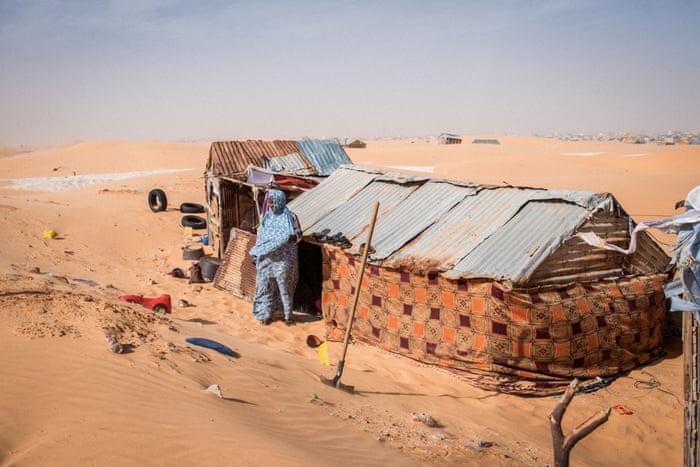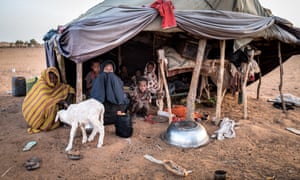Mauritania : Human Misery Incarnate
"I have been hit, tortured, humiliated -- I'm always the first to wake up and the last to go to sleep."
"None of us ever went to school. None of us had identity or civil papers. I received no support, no one could help me."
"I was totally at the mercy of my masters."
Habi Mutraba, Maurtania
 |
| Former slaves Habi and her brother Bilal, above left, stand in front of Bilal’s garage outside Nouakchott. The siblings were both slaves to a family east of the capital, but Bilal fled suddenly one day after his master beat him. After several attempts to rescue his sister, who was a victim of sexual abuse and forced labour, she was finally freed with the help of SOS Slaves in 2008. Today, the pair live in a poor neighbourhood on the periphery of Nouakchott. With the help of some activists, Bilal recently opened a small tyre-mounting garage |
"For the last two weeks, we have been thrown into the corridor of a cramped courtyard with no roof to shelter us from the rain."
"It [his arrest] was necessary to prevent me from entering the assembly and, better still, to invalidate my claim to run for the presidency of the republic in 2019."
"The only solution to ending slavery in Mauritania is that Europe and the U.S. as well as donors, stop giving money to the Mauritanian regime."
Biram Dah Abeid, anti-slavery advocate, Mauritania
"The government turns a blind eye because, traditionally, they are the affluent ethnic group who owned slaves."
"They have run the country and still do."
Jakub Sobik, Anti-Slavery International
"They raped me, all the time, and so I became pregnant with my first child. They did this all the time, every day, whenever they wanted."
"My daughter was taken from me when she wasn't even five and so it was that my own story was repeating itself."
"To really stop slavery, an uprising of all the former slaves is needed, to unite with human rights movements globally."
Barkam Tusakim, 30
 |
| Mauritania is a bridge between the Arab Maghreb of north Africa and darker-skinned sub-Saharan Africa. The ruling Arab-Berbers have higher paid positions in jobs and government, while the darker-skinned Haratines and Afro-Mauritanians are under-represented in leadership positions and face many obstacles in society, from access to education to well-paid jobs |
Taken herself at age five from her own mother, this woman is now seeing her own horrible life as a child inducted into a life of slavery repeated with her daughter. Mauritania is the last country on earth where human slavery persists as part of the culture, despite that formally in 1981 it abolished slavery. While doing so, it overlooked the necessity to introduce criminal laws to enforce the ruling until 2007.
Anti-slavery NGO SOS-Esclaves estimates that at least 500,000 people remain enslaved in the country representing 18 percent of the population; a number vastly greater than any other country internationally. The slavery culture is deeply engrained dating hundreds of years back, passing through family lines where slaves are born into servitude. The enslaved population is isolated to the extent that most have never known any other life.
Slave owners include government officials, and Judges. Slave owners never traditionally release a slave to freedom. Routine tradition sees slaves traded between families, treated just as livestock would be; material possessions. In their master's house slaves cook and clean, or are tasked to live their lives in desert areas herding goats or camels in remote regions for months on end.
Habi, who spoke of the miseries she experienced in her West African country, was enslaved from birth when her mother was raped by her "master". On her birth, Habi was given as a gift to another member of the extended family. She tended to livestock or worked in the household, fetching water, preparing food and was regularly raped by the household head under knife threat. Her own pregnancy resulted by the son of the household raping her.
She did manage to free herself, escaping with the aid of Biram Dah Abeid who helped organize her rescue and who is himself being held in the Nouakchoff Central Prison, uncharged with any offence, his sixth imprisonment where he has been denied sleep, showers and a mosquito net, and nor is he permitted family visits, medical care and legal advice. His sin, that of confronting government and planning to run for election himself.
 |
| A Tarhil neighborhood resident outside her house, where she was relocated by the state when her slum in Dar Naim was demolished to make way for the construction of a road. Married, with two children, she sells biscuits to passersby while her husband holds small jobs in the city. “If we had the budget, we would have rented a room in Nouakchott. Here, we don’t even have water – we have to pay for a cart to deliver water,” she says. |
The Sahara Desert makes up a huge part of Mauritania where black sub-Saharan Africans are held hostage to the beydan tribe as slaves to tend livestock. It is the light-skinned beydan Berbers which are the minority of the population, forcing the Haratine ethnic group of blacks to a lifetime of slavery. A rigid caste system maintains that social order, with the majority of the country's wealth in the hands of the beydan.
The country's president is beydan along with his political allies. Even those haratine who are free face legal and practical obstacles in obtaining property, land or employment, with little political incentive to modernize the system, since many of Mauritania's political and judicial figures are themselves slave-owners. Complicating matters is Mauritania posing as an ally in the West's efforts to stop irregular migration and end terrorism in the Sahel.
Britain, France and Spain managed plans to increase EU funding for the G3 Sahel that will benefit Mauritania which has received millions in EU funding to stem migration. International advocacy groups are denied entry to the country, leaving internal activists isolated and on their own, fighting for change.
 |
| The Haydel family in front of their tent next to their master Sheikh Ouled Mhammed’s house. Photograph: Seif Kousmate/Hans Lucas |
Labels: Caste, Human Rights, Mauritania, Rape, Slavery, Violence

<< Home